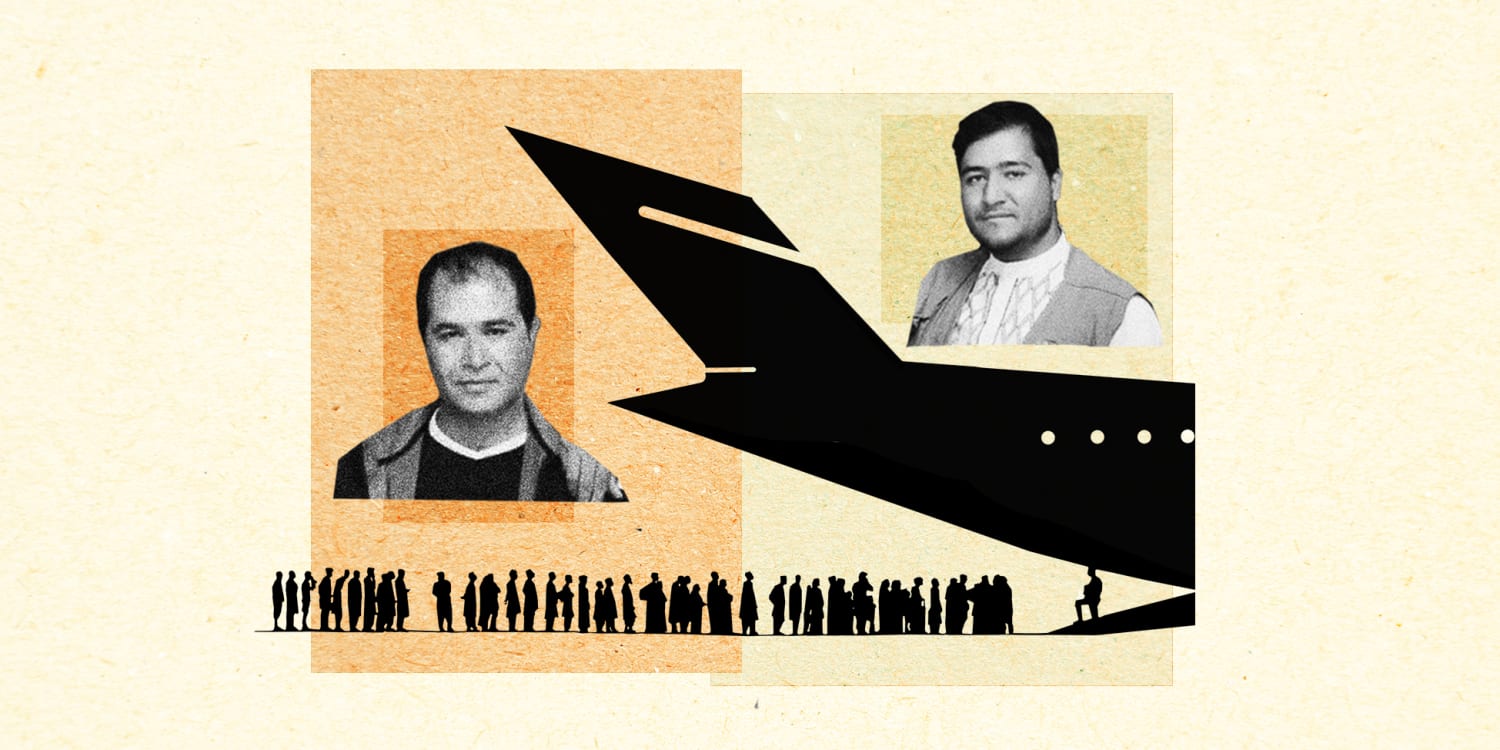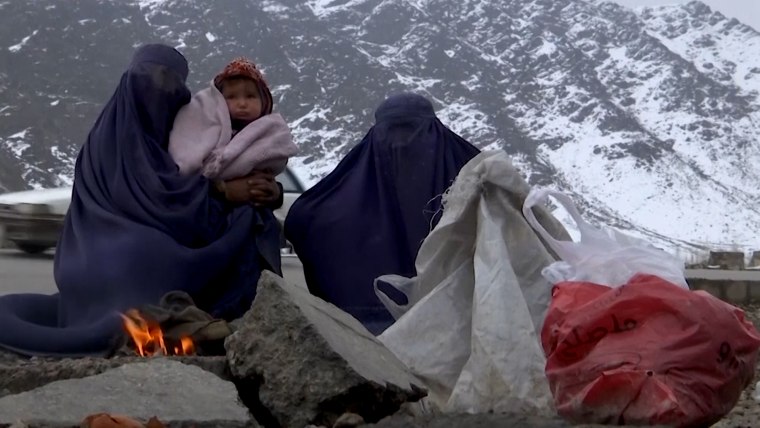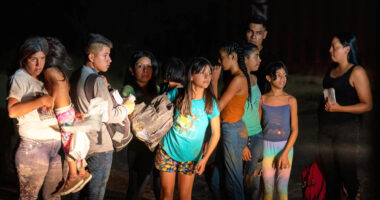One was at work, the other at home on the day the Taliban swept into Kabul last year. Within days, Janagha and Shafiqullah Sarwari’s lives would change immeasurably.
“I was very happy that at least one of us, Janagha, made it out,” Shafiqullah, 31, told NBC News in a telephone call last month from Kabul, where he said he lives in constant fear of Afghanistan’s hard-line rulers. His brother, meanwhile, is building a new life in the United Kingdom.
“On the other hand,” he added. “I had a deep feeling of sadness, I was so unlucky.”
Janagha, 38, said that on the morning of Aug. 15, he rose at 6 a.m. sharp at Camp Taipan, a base at the Hamid Karzai International Airport, where he worked as a mechanic. Across town, around 6 miles from the airport, his younger brother was at home and already up for the morning prayers.
Within hours, the Taliban had rolled into Afghanistan’s capital unchallenged, prompting the country’s then-President Ashraf Ghani to flee to the United Arab Emirates and accelerating a chaotic scramble by the United States and other Western nations to evacuate their forces, diplomatic staff and Afghans eligible to leave the country.
Shafiqullah said he had also worked at Camp Taipan but was on leave from his job and could not reach the base to be evacuated. The security company whose subcontractor he was working for disputes this and says he was no longer employed.
“We worked on the same project, at the same place but I didn’t benefit,” he said.
Their story will resonate with many.
New beginnings
Janagha was among the tens of thousands of Afghans evacuated alongside American and allied citizens.
Ten days after the Taliban takeover, he touched down at Birmingham’s airport in England’s Midlands, with his wife, Hamkima, and their four children, Ahmad Sahil, 14, Marwa, 11, Ahmad Sohail, 9, and Salah, 2.
After months of living in a hotel, in early December the family moved to their own house in Norwich, a small medieval city around 120 miles north of London.
Receiving the news that they would be evacuated left Janagha with mixed feelings, he said in a recent telephone call from his new home.
“It was a paradox,” he said, adding that he was “deeply concerned about my country falling into the hands of the Taliban,” but happy because “finally we would be rescued.”
Since April 1, Britain has resettled more than 8,000 Afghans who worked for or alongside the United Kingdom, or members of their families, according to a U.K. government spokesperson.
Through a separate scheme, which aims to help vulnerable people, as well as those who stood up for values such as democracy and women’s rights, the U.K. has said it is committed to welcoming around 5,000 people this year and up to 20,000 over the coming years.
“We undertook the U.K.’s biggest and fastest emergency evacuation in recent history, helping over 15,000 people to safety from Afghanistan. We will continue to do all we can to enable those who are eligible for relocation,” the spokesperson said.
Janagha said his family was settling in well and he was attending the local mosque where he said the people were friendly. His children had just enrolled in local schools, he added.
The challenges include a dearth of Persian speakers and Britain’s brooding skies which have left him hankering for the clear vistas of Kabul, he said. Above all else, he said, he missed his family and hoped one day they would be able to join him in Britain.
Brotherly bond
The middle brothers in a family of seven children, Janagha and Shafiqullah grew up in Kabul where their father worked as a driver, while their mom stayed at home to raise them.
She filled their home with the aromas of traditional Afghan cooking, Shafiqullah said.
Both brothers described their childhood as modest but happy, filled with memories of skipping school, playing football and swimming in the Kabul River.
“At the time it wasn’t too dirty, we had very blue, green water, very pure water,” Janagha said.
Once grown, their sisters got married and the three boys in the family, like so many who came of age after the U.S.-led invasion in 2001, found employment in the enormous industry facilitating the foreign military presence in the country. By the time that presence collapsed last year, both had worked for foreign troops, Janagha as a mechanic and Shafiqullah in the kitchens.
Then, this summer, their paths diverged dramatically.
Shafiqullah said that during the evacuation in August, he was on leave from his job working for the Houston-based defense contractor KBR after contracting Covid-19. He said that on testing positive he, Janagha and others were told to go home because there was no treatment facility at the camp. In the weeks that followed, he said, he had been waiting for them to call him back to duty.
“After a while, they called Janagha back but not me,” he said.
When the evacuations started, he said, he was told by his manager to have patience but that he had not heard from the company or the British government since.
A spokesperson for KBR said Shafiqullah had worked for its subcontractor, the British company, Global Staffing Solutions, from July 2018 until May 2021.
Both Shafiqullah and Janagha had contracted Covid in May along with a number of other Afghan workers, the spokesperson said, adding that they made the decision to leave the camp and, in doing so, their employment was terminated. The company closely followed the Covid-19 protocols and procedures of the U.K.’s defense ministry, the spokesperson said.
In July, Janagha was reinstated and was relocated to the U.K. because of his work on KBR’s behalf, the spokesperson said. The spokesperson said Global Staffing Solutions sent an employment verification letter, also signed by KBR, to Shafiqullah so that he and his family could apply for relocation to the U.K. or the U.S.
Shafiqullah said KBR had not told him his job had been terminated.
But the KBR spokesperson said questions about communication Shafiqullah had with his employer should be directed to Global Staffing Solutions. Global Staffing Solutions could not be reached for comment.
A spokesperson for Britain’s defense ministry said contractors were not usually eligible for relocation under the ARAP scheme but that in some circumstances, applicants may have had secondary roles that qualified them for relocation. The ministry could not comment on individual cases, the spokesperson added.
Parallel lives
Meanwhile, the brothers’ lives remain worlds apart.
In Norwich, Janagha’s eldest children are attending school, while their cousins, Mohammed and Bilal are missing out on an education back in Kabul as the family keeps moving to evade the possible wrath of the Taliban.
Shafiqullah is just one of the hundreds of thousands of people refugee advocacy groups and humanitarian organizations estimate worked for foreign troops, diplomats, charities or other projects financed by the U.S. or its allies, who remain in Afghanistan and face persecution.
The Department of State declined to comment when asked how many Afghans remained in Afghanistan who have applied for a special immigrant visa or other visas to resettle in the U.S. Since late July, the U.S. has welcomed some 76,000 Afghan nationals through Operation Allies Welcome, according to the Department of Homeland Security.
Like so many of his fellow Afghans, Shafiqullah said he was struggling to put food on the table and a roof over his children’s heads.
Jobless and with rent to pay, he said he has been selling his possessions including carpets and his television. More than half the country is in urgent need of more food, according to the World Food Program.
“We’re just surviving,” he said. “We have nothing else to sell.”
He implored the British government to process his family’s documentation and to transport them to a place where his children could go to school and where they could live in peace.
“I trust in destiny, but I feel that human beings’ efforts also have an effect,” he said. “If the British government considers my case, God willing, I will be in Norwich with Janagha.”
Source: | This article originally belongs to Nbcnews.com










